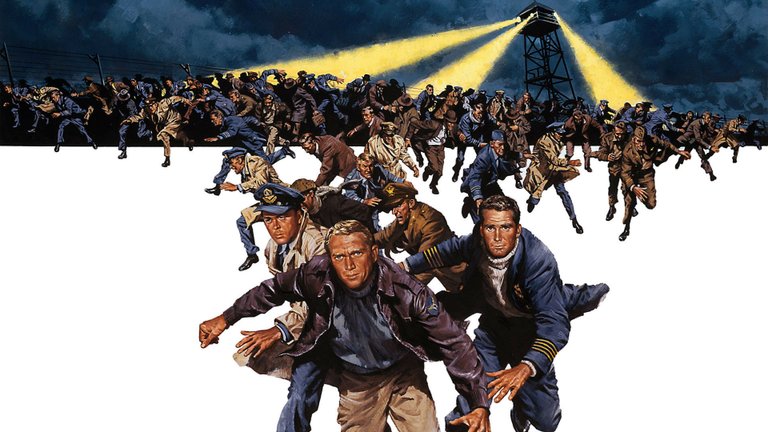
With the passage of time, even monumental events such as the Second World War are inevitably perceived and treated differently in cinematic portrayals. By the early 1960s, the last global conflict began to be viewed not merely as a solemn piece of tragic or heroic history but also as an excellent backdrop for Hollywood spectacles or Boys' Own Adventure-style action narratives. This transition is notably exemplified in The Great Escape, a 1963 film directed by John Sturges, which has since become one of the most popular war films ever made.
The story of The Great Escape is grounded in a real event that transpired in March 1944, which was indirectly witnessed by Paul Brickhill, an Australian writer and former fighter pilot. After being shot down over Germany, Brickhill spent the remainder of the war in Stalag Luft III, a POW camp where he began documenting his experiences. His writings culminated in a book published in 1950, which became a bestseller. This work was first adapted into a television play on NBC in 1951. In addition to The Great Escape, Brickhill authored The Dam Busters, which was adapted into a classic British war film in 1954.
The film opens in 1943, when a significant number of captured Allied air force officers are transferred to a newly constructed POW camp under the command of Luftwaffe Colonel von Luger, portrayed by Hannes Messemer. These prisoners, led by RAF Group Captain Ramsey (played by James Donald), are relocated due to their repeated escape attempts; the Germans’ strategy is to keep "all rotten eggs in one basket." Although escape seems impossible, RAF Squadron Leader Roger Bartlett—nicknamed “Big X” and played by Richard Attenborough—has other ideas. A seasoned veteran of numerous escape attempts, Bartlett quickly formulates an audacious plan for a mass breakout involving hundreds of prisoners. His primary objective is not merely to secure freedom for his comrades but to compel the Germans to allocate substantial troops and resources toward their recapture, thereby hindering their war efforts. With Ramsey’s approval, various prisoners leverage their diverse skills—engineering, tunnelling, black market dealings, clothing production, intelligence gathering, and document forgery—to bring this plan to fruition. Initially reluctant to participate, US Army Air Force Captain Virgil Hilts (played by Steve McQueen) ultimately reconsiders after the tragic death of his friend, RAF Flying Officer Archie Ives (played by Angus Lennie).
Running nearly three hours and featuring lush colour cinematography by Daniel L. Fapp, The Great Escape resembles the "larger-than-life" historical epics that Hollywood was known for during this period. However, much of the film is confined to the relatively unexciting setting of the POW camp itself; there is little action until the actual escape and its aftermath unfold in the final third of the film. This pacing allows for a thorough exploration of character development and plot establishment before dealing with the climactic escape sequences.
John Sturges, who gained acclaim for his Westerns such as Gunfight at the O.K. Corral and The Magnificent Seven, maintains a solid pace throughout The Great Escape. He dedicates the first two hours to meticulously setting up the plot and showcasing preparations for the escape alongside various intriguing characters involved in the operation. The film benefits from an impressive ensemble cast that includes Charles Bronson as Polish RAF officer Danny Welinski and James Coburn as Australian flying officer Sedgwick—both of whom reunite with McQueen from The Magnificent Seven. This strong casting contributes significantly to character depth and audience engagement.
While many characters are fictionalised versions of real individuals—often with altered nationalities—their portrayals resonate with authenticity. McQueen emerges as the standout star of The Great Escape, embodying a sense of “cool” that would define his career moving forward. His character was created as an American primarily to enhance box office appeal in North America; furthermore, McQueen exerted considerable influence on set, insisting that his character ride a motorcycle during an action scene to showcase his own driving skills.
Despite its foundation on non-fictional accounts, The Great Escape has been praised for its authenticity even though it takes creative liberties with historical accuracy. The characters may be composites inspired by real individuals—often with their nationalities changed—and certain scenes depicting violence and daring escapades during the escape are entirely fictionalised. However, some authentic elements were contributed by cast members themselves; for instance, Donald Pleasance portrayed document forger Flight Lieutenant Colin Blythe and had been an RAF pilot during WWII who spent time in a POW camp after being shot down. Conversely, German actor Til Kiwe played camp guard Frick; he was a German paratrooper who made several escape attempts from a POW camp in Colorado after being captured in North Africa.
One aspect that elevates The Great Escape is its exceptional soundtrack composed by Elmer Bernstein. The main theme—a catchy march—has become one of the most recognisable pieces of film music from the 1960s, enhancing both tension and excitement throughout key moments in the film.
Despite some contemporary critics expressing reservations about certain aspects of its execution, The Great Escape emerged as a massive hit upon release and played a pivotal role in sustaining Hollywood's trend towards spectacular WWII-themed action films well into the 1970s. In 1988, it received a sequel titled The Great Escape II: The Untold Story, which explored events following those depicted in the original film.
While there are notable issues with pacing—particularly given that many characters meet tragic fates that contrast sharply with the generally optimistic tone of the film—The Great Escape remains worthy of recommendation even for viewers primarily interested in action rather than historical fidelity.
RATING: 7/10 (+++)
Blog in Croatian https://draxblog.com
Blog in English https://draxreview.wordpress.com/
InLeo blog https://inleo.io/@drax.leo
Hiveonboard: https://hiveonboard.com?ref=drax
InLeo: https://inleo.io/signup?referral=drax.leo
Rising Star game: https://www.risingstargame.com?referrer=drax
1Inch: https://1inch.exchange/#/r/0x83823d8CCB74F828148258BB4457642124b1328e
BTC donations: 1EWxiMiP6iiG9rger3NuUSd6HByaxQWafG
ETH donations: 0xB305F144323b99e6f8b1d66f5D7DE78B498C32A7
BCH donations: qpvxw0jax79lhmvlgcldkzpqanf03r9cjv8y6gtmk9